QuestionQUESTION: I have a male guinea pig and he has recently (the last week and a half) has stopped eating regularly. And drinking very little.I took him to our small town vet and they gave him IV fluids and some sort of shot,maybe a steroid. This is after three days of Amoxicillin. He has then since stopped eating again, or very very little. He will eat a carrot or a half of a grape every so often but then go back to his igloo. Chirps like normal when my husband whistles at him, comes out when we sit at the table to eat but just seems like he is in his house all the time. Very abnormal for him. He is very social with us. And he also isn't pooping but maybe a pellet a day.What do you think this could be? I put a lot of hay and clean water every day. He is urinating but no poop. Help! He is our baby.Thanks!!
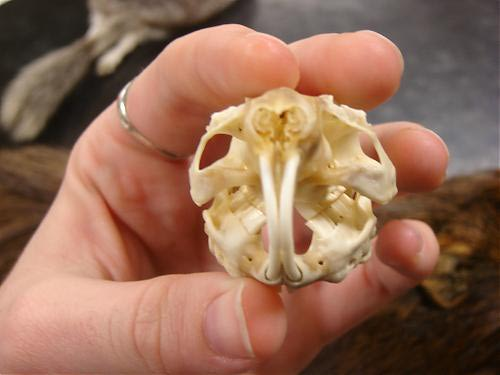 cavy teeth
cavy teeth
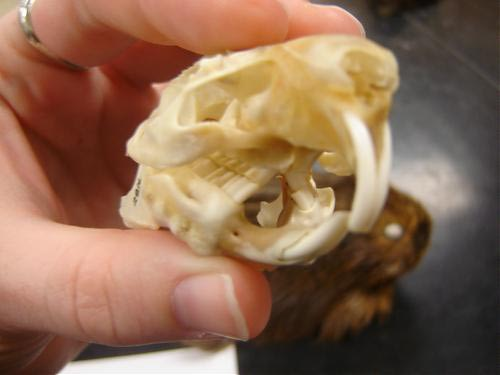 cavy teeth
cavy teeth
ANSWER: I'm sorry to hear your baby is ill. My first impression is that your vet has little or no experience with cavies (aka guinea pigs). Any kind of penicillin is an absolute no no for guinea pigs. Amoxicillin is very likely the cause of his refusal to eat.
There is a misunderstanding as to why cavies cannot tolerate penicillins. It is not poisonous to their system. It destroys the natural 'good bacteria' in the gut and leaves the animal open to secondary infections which often result in death. The typical treatment using antibiotics is either Bactrim or Baytril.
What is most likely happening is that he has a terrible belly ache from the medication and cannot eat because of it. That results in dehydration and starvation. Of course that doesn't tell us why he stopped eating in the first place, and I'm sure the vet was just covering all bases by giving him Amoxicillin in the first place.
Very often a pig will stop eating because of a dental issue. We cannot see the back teeth as they are not very cooperative about opening their mouths enough to get a good look. There are an entire set of teeth back in the jaw that are the tools they need to chew. The incisors or front teeth are simply used to bite down and break their food. The food then goes to the back teeth for grinding.
If those teeth get out of alignment the animal is unable to properly grind up their food, and in some cases a tooth can be cutting into the tender flesh making it painful to chew. One of the things you can do is get some Critical Care to supplement his dietary needs. It can be compared to Ensure for humans as it has all the nutrients their bodies need to keep them going.
In the meantime stop giving him the Amoxicillin. I don't know if you've ever had the drug Augmentin. It is a combination of Amoxicillin and another drug called Clavulanate acid and is very effective in humans, but one of the common side effects is abdominal pain. It's a good drug if you can take it but a large percentage of people who have taken it suffer the side effect. With some they can tolerate the pain long enough to finish the course of treatment, but many people cannot. Animals can have the same reactions. And when you have abdominal pain you don't' want to eat. It hurts.
What you will need to do is to give him some probiotics which help to maintain that good bacteria necessary for digestion. So often we think that bacteria in general is bad, but that's not so. It's a necessary part of life and we cannot live without it.
I'm not faulting your vet for his inexperience with guinea pigs. Cavy knowledgeable vets are hard to find. The biggest reason is that there is little or no research money for studying the needs of guinea pigs. They've been used as test animals for many years, but studying their needs has not been given much research. The vets who do know about guinea pigs are often breeders and exhibitors themselves and their expertise is experience based. Guinea pigs are not a big enough industry for most vets to have the opportunity to treat them.
One thing you did not mention is his age. After the age of four many pigs begin to go downhill. The average lifespan is 4 - 5 years, although there are exceptions. When they reach their time they will often stop eating and drinking. They drop weight, the coat gets very rough and in general they just deteriorate.
But let's assume that age is not the cause of his current condition. This could well be a dental issue. If that's the case you'll need to be creative with his diet and give him things he can chew comfortably. The lack of stool is probably because of lack of food. If the intake is low the output will also be minimal.
You can try mashing his pellets so that he doesn't have to work to chew them. The Critical Care is necessary for keeping his body strong. If you can't find Critical Care there's another trick I've used when I've lost a mother with a new litter. Baby formula can be used as a replacement. I use the soy based formula, dilute it with twice the water called for on the can and put it in their water bottle.
The pigs seem to love it and I've had great success with it. Do keep a bottle of water alongside the formula as well. And of course you'll need to empty and clean the bottle after about eight hours so that the milk does not sour.
If you happen to have young children you might ask your pediatrician if they have any samples. Most pediatricians (or their nurses) are happy to help you out. They are given samples of all the formulas by the drug reps that come in regularly to their offices.
I've posted a couple of pictures of cavy teeth so you can get an idea of how their dental anatomy is designed. You can see why it's so hard to see the back teeth just by opening the mouth. The front teeth are quite obvious but there's a space between the incisors and the molars where there are no teeth. When you open the mouth the cheeks fall inward making it almost impossible to see the molars.
You can see how they must fit like a puzzle in order to effectively do their job. If there's a broken tooth or an overgrown molar it makes it very difficult for the pig to grind their food to swallow.
Please let me know how he does. And don't be shy about asking around to find a vet who has some experience with guinea pigs.
---------- FOLLOW-UP ----------
QUESTION: Thank you so much for your quick response. I quit giving the Amox after 3 days. He is eating finely chopped hay but it's almost like he was dehydrated and now he just can't quite get the jump on staying that way. The few pieces of poop I have found are lighter than usual and hard, probably because of the dehydration. We lost his litter mate about 6 months ago from what I think was an untreated cold or pneumonia. And yes it sucks cause I can't find aver locally that treats little guys like them. He is only 3 and very active and social. So I'm gonna lean towards the tooth problems. But how do you find a vet that can treat him. I've searched the web with no success. I will try to get the critical care from Petsmart in Little Rock but I am unsure if they treat guineas. And it's 90 miles away. So I would hate to put him through the stress of the ride up there just to be turned away. Thanks again and I will keep you posted!
AnswerThe easiest way to find a vet for him is by looking online. I would also recommend that you hang a bottle of Gatorade in his cage. Again, dilute it as you would the formula. The electrolytes in Gatorade are excellent for treating dehydration. The baby formula will also help, but he may go for the sweet Gatorade more quickly and that's okay.
The lighter colored stool is a result of his diet. He's not eating normally so the stool wouldn't be normal in color. If he will eat some lettuce you can offer him some Iceberg lettuce, the round watery lettuce that basically has little in the way of nutrients but is a good source of fluid as it's mostly water. It doesn't take much chewing to digest it so that might work as well.
Typically a malocclusion of the back teeth will cause them to not try to eat at all. So if he's trying that's a good thing. The antibiotic may set him back a few days as well. In the meantime whatever you can get him to take through his water bottles may help him over this phase.



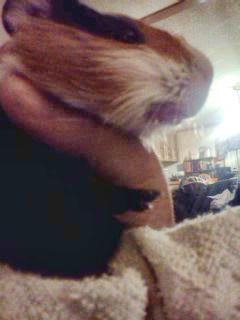 male guniea pig
QuestionQUESTION: hi i have a male guinea pig that will
male guniea pig
QuestionQUESTION: hi i have a male guinea pig that will
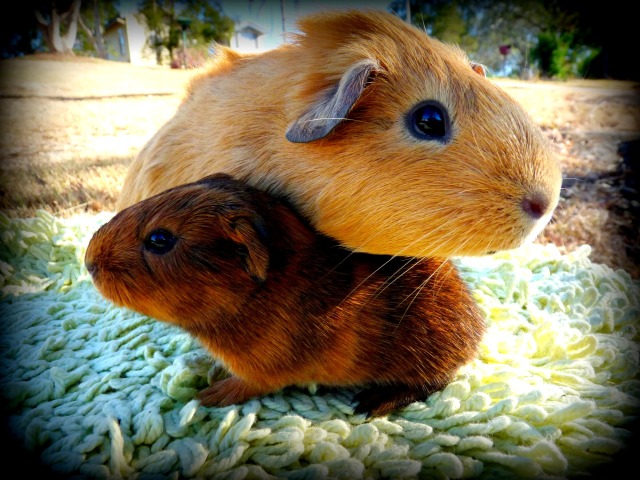 Its a boy! And a boy! And a girl! I think.
Question
Peaches
Hi Pat
I want to thank you so much fo
Its a boy! And a boy! And a girl! I think.
Question
Peaches
Hi Pat
I want to thank you so much fo
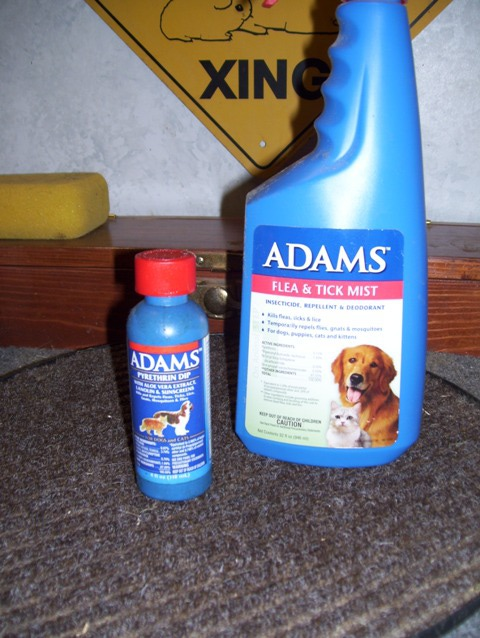 Timothy hay
QuestionQUESTION: Hi. I purchased a pack of Timothy hay
Timothy hay
QuestionQUESTION: Hi. I purchased a pack of Timothy hay
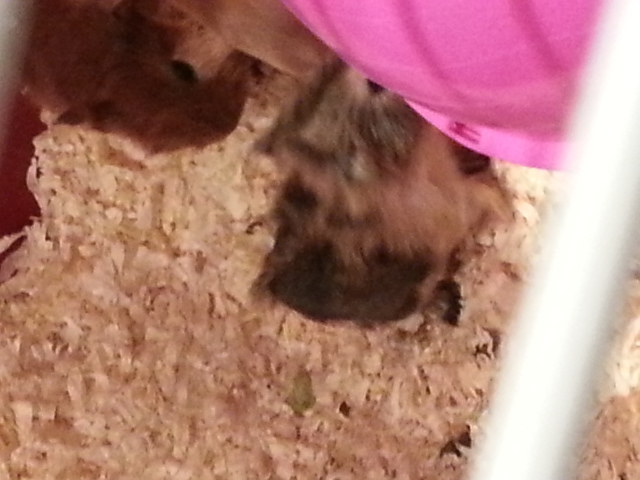 guinea pig babies
QuestionQUESTION: Hi, my two soars have had babies four
guinea pig babies
QuestionQUESTION: Hi, my two soars have had babies four
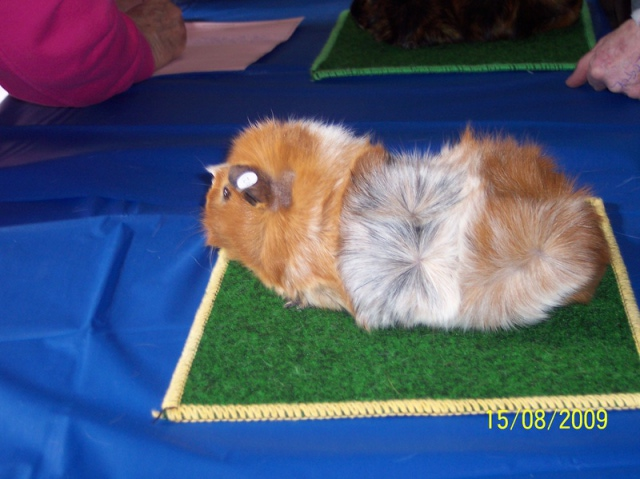 Guinea Pigs Care
QuestionQUESTION: Hi. My name is Nikki and my birthday
Guinea Pigs Care
QuestionQUESTION: Hi. My name is Nikki and my birthday